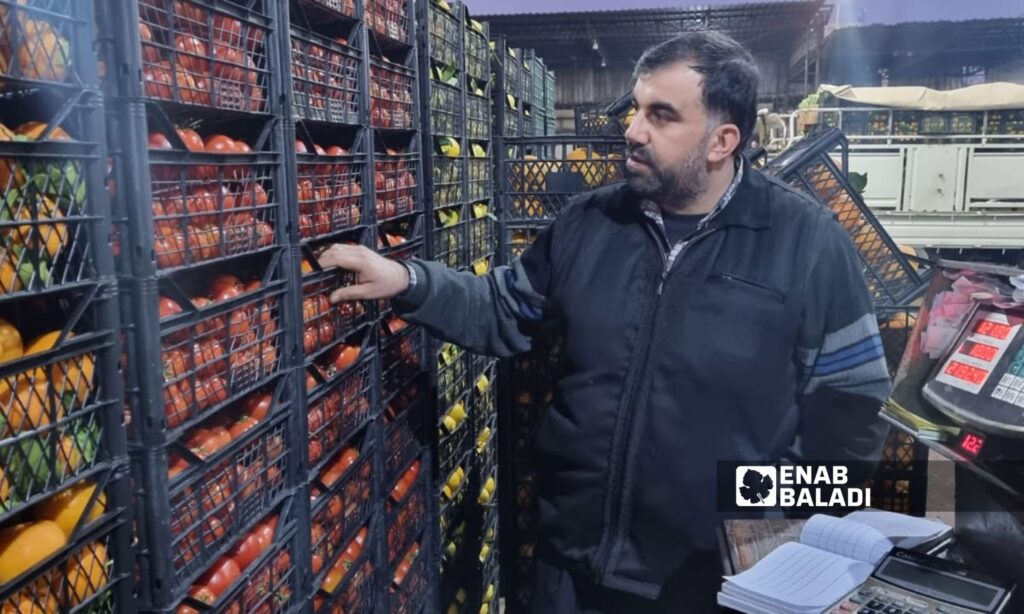Idlib – Anas al-Khouli
Vegetable merchant Abdou Jama complains about flooding the al-Hal popular market with imported tomatoes in quantities that exceed the market’s capacity, leading to a drop in prices and financial losses for the merchants.
Jama, 35, told Enab Baladi that the area’s capacity for tomatoes is four refrigerators per day, equivalent to 100 tons, while the market is flooded daily with about 12 refrigerators, containing between 250 to 300 tons, which are doubled quantities.
These quantities have caused a severe price fluctuation, leading to Jama’s loss of 50,000 Turkish liras in just the past November, and he fears that the losses will double in the current December despite being forced to trade in other varieties to compensate for the losses.
Idlib governorate has witnessed a 30% decrease in tomato prices as a result of the speculations among the merchants in the al-Hal market, making the commodity available to citizens at an acceptable price amidst the increase in prices of most goods and the hardship in securing living expenses.
Imported tomatoes
Jama, like his counterparts, imports tomatoes from Turkey at a price reaching 15 Turkish liras per kilogram, including transportation costs, while the selling price in the market reached 11 Turkish liras.
Rajeh al-Jaml, another merchant in al-Hal market, stated that the merchants currently rely on importing plastic tomatoes from Turkey after the end of their season in the region, due to the delay in importing local tomatoes from Egypt, which are relatively cheap, resulting in losses for the merchants.
Al-Jaml believes that speculations are a natural occurrence in markets and that merchants are accustomed to it, but the losses in the case of tomatoes have exceeded the merchants’ expectations and their ability to tolerate.
He indicated that his losses from trading in tomatoes due to flooding the markets with them during the current December reached 725,000 Turkish liras, noting that the markets in Idlib follow a “free” trading approach, benefiting the citizens.
Several merchants whom Enab Baladi met demanded the determination of the quantities entering through the commercial crossings in order to prevent flooding the markets and protect them from severe speculations while safeguarding local production.
Open import of goods
The Public Relations Director at the Ministry of Economy of the Syrian Salvation Government (SSG), Hamdo al-Jasim, told Enab Baladi that the Salvation Government had adopted a policy to support local production by implementing an agricultural schedule that prohibits the import of vegetables and fruits during their seasons for specific periods.
Al-Jasim added that the import of goods and commodities is open to all items, and the government seeks to achieve self-sufficiency in many goods and products, determining the market’s needs and distributing import shares according to the product.
He mentioned that the government is making efforts to explore foreign markets and work on securing a market for products that exceed the region’s needs.
He also pointed out that policies to protect local products are applied to some items, and the government encourages competitiveness among local companies to improve product quality and reduce prices, which benefits the locals.











